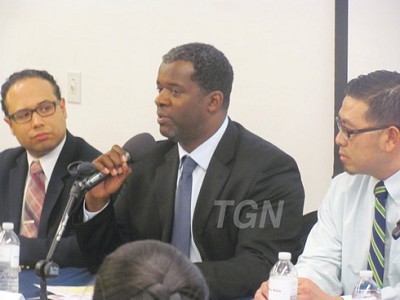
GARDNER – In an effort to close out Black History Month with a healthy dose of food for thought, Mount Wachusett Community College hosted a well-attended panel discussion and luncheon titled Men of Color on Monday.
A major theme of the event was listening to panelists as they described their experiences growing up and becoming aware of race relations in society. Jesse Edwards, director of Diversity and Equal Opportunity for the University of Massachusetts Medical School, said he grew up in Lowell in the projects with parents who didn’t graduate high school.
“I knew in the community I was living in, there weren’t many role models. You’re always constantly, I feel like, having to prove yourself,” he said. “We’re not living in a post-racial society,” said Eric Rodriguez, director of organizing at the United Neighbors of Fitchburg, a social service organization. Edwards and Rodriguez took part in a five-man panel.
Also included was Dr. Brian Lewis, a biology professor at UMass Medical School, Train Wu, a senior community outreach counselor for the Mount, and Waldo Zamor, a medical student from UMass Medical School set to graduate this year and practice dermatology. While Edwards, Lewis, and Zamor are black, Rodriguez is Hispanic and Wu is Asian, which allowed the panel to represent a broad spectrum of minority perspectives.
Much of their discussion focused on racial tensions that still exist in America and how they have felt personally about race in society. Lewis spoke about racial differences in America from an interesting perspective, having grown up in Jamaica, a nation with a history of slaves working on sugar plantations and a large percentage of its population being black. He said in Jamaica, he saw economics as more of an issue than race, but when he came to America to study at the University of California in Los Angeles, he encountered a different viewpoint.
“I realized for everyone else around me, race was a big issue. The key is recognizing differences and dealing with differences in a positive way,” he said. Julianna Ladd attended the panel discussion and is a student in the Mount’s Gateway to College program, which allows high school students to earn college credits. She noted that the panel members have all become professionally successful and asked them how their perspective on race might be different if they lived a poor area such as Section 8 housing, which is government-subsidized.
Zamor – who grew up in Queens, New York and Brockton – spoke about the troubles of a “self-fulfilling prophecy” that people growing up in a poor neighborhood face, the difficulty they have in overcoming negative stereotyping. “These are all constant daily evaluations that you are not worth it. You’re being told that you’re one thing constantly and you develop into it,” he said. Wu, who was born in Laos in 1975 and spent time in a refugee camp in Thailand before moving to Fitchburg, said that in Fitchburg he lived in a Section 8 housing neighborhood.
“That was my burn; those were the times where I knew one day I would get out. For me, it was that I had to find something better … education is the only thing. You can become what you want to be. I still believe in that phrase,” he said. Greg Germagian, another Gateway to College student, asked panel members, “What are some ways you have been discriminated against because of your race?”
Zamor recalled a recent example in which as a medical student, he was given a patient to care for. The patient made it known their preference to be seen by someone else, despite the other options being medical students with less experience than him. He said he tried not to be offended and was ultimately able to convince the patient to allow him to provide care.
“Have some awareness that this shortcoming of the human race exists and it’s not personal. Anyone can be discriminated against; color is just one dimension of it,” he said.
While the dialogue mostly focused on their personal experiences, there were some questions targeted about how the issue of race is changing with newer generations. They commonly agreed that while there has been progress in all races being treated equally, society is still not “color-blind,” and issues such as reforms in the criminal justice system still need to be addressed to ensure fair treatment for everyone.
Another key point of conversation was the importance of civic engagement and being an independent thinker who is open-minded and doesn’t rely on unreliable information such as social media posts to develop opinions. “I would say everyone in this room needs to vote. The onus is also on us to make change happen,” said Rodriguez.
Andrew Mansfield, The Gardner News, March 1, 2016

